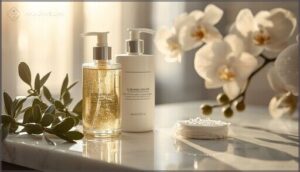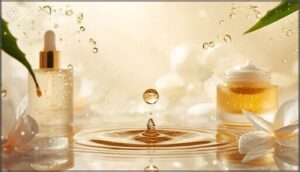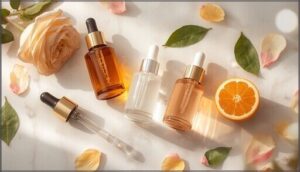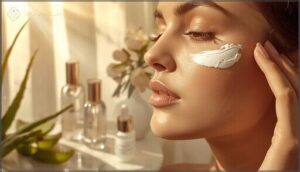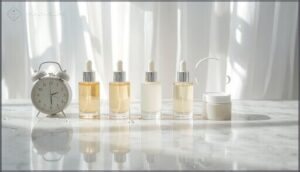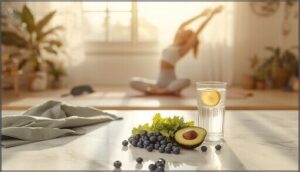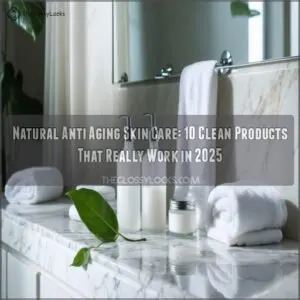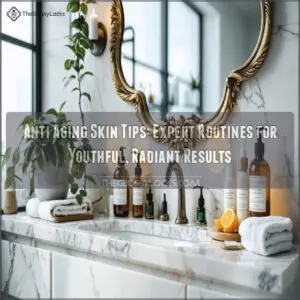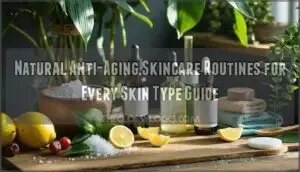This site is supported by our readers. We may earn a commission, at no cost to you, if you purchase through links.
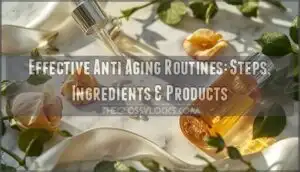
The good news is that effective anti-aging routines can work with your skin’s biology, not against it, to restore much of what time takes away. Unlike the products your mother used, today’s formulations are backed by decades of clinical research showing exactly which ingredients trigger collagen production, neutralize free radicals, and reverse visible signs of photoaging.
The right combination of cleansers, serums, and sunscreen—applied in the correct order—can deliver measurable improvements in texture, firmness, and tone within three months. Your results depend less on expensive miracle creams and more on understanding how active ingredients work together and committing to a science-based approach.
Table Of Contents
- Key Takeaways
- Key Steps for Effective Anti Aging Routines
- Essential Ingredients for Youthful Skin
- Top 5 Products for Anti Aging Routines
- Lifestyle Habits to Enhance Anti Aging Results
- Frequently Asked Questions (FAQs)
- What is a good anti-aging routine?
- What are some exercises to slow muscle aging?
- What is an anti-aging skin care routine?
- What is the best skin care routine for healthy aging?
- When is the best time to start an anti-aging routine?
- What is anti aging skin care?
- What is the best anti-aging routine?
- What is the most effective anti-aging procedure?
- What is the most effective anti-aging exercise?
- What is the best thing to use on your face for anti-aging?
- Conclusion
Key Takeaways
- Your skin cell turnover slows from 28 days in your twenties to 50-plus days by your fifties, which explains why fine lines appear suddenly and why consistent use of evidence-based products—retinol, vitamin C, hyaluronic acid, peptides, and daily SPF—can deliver measurable improvements in texture and firmness within three months.
- The correct application order matters as much as product selection: start with cleanser, layer serums from thinnest to thickest texture, follow with moisturizer, and finish with SPF, because reversing this sequence blocks active ingredients from penetrating effectively and undermines your results.
- Daily broad-spectrum SPF 30 or higher is your single most effective anti-aging step, since UV exposure breaks down collagen and causes photoaging faster than any serum can repair—making sunscreen non-negotiable regardless of your other product choices.
- Lifestyle factors including balanced nutrition with antioxidants, stress management, quality sleep, and regular exercise directly influence collagen production and cellular repair, meaning your anti-aging results depend on both what you apply topically and how you support your skin’s biology from within.
Key Steps for Effective Anti Aging Routines
Building an effective anti-aging routine isn’t about buying every product on the shelf—it’s about understanding which steps actually work. A strategic approach protects your skin from damage while actively addressing signs of aging that have already appeared.
Let’s walk through the essential steps that form the foundation of any evidence-based anti-aging routine.
Gentle Cleansing and Double Cleansing
Think of double cleansing as your skin’s nightly reset button—it’s the foundation that clears away the day’s buildup so everything you apply afterward can actually do its job. Start with a cleansing oil or micellar water to dissolve makeup and sunscreen, then follow with a pH-balanced wash or gentle face cleanser suitable for sensitive skin.
This nighttime cleansing step guarantees your hydrating facial cleanser won’t just sit on the surface—your skin cleansing ritual actually gets aging skin ready to absorb the treatments that follow.
Hydration and Moisture Retention
After you’ve cleared the surface, your next priority is locking in moisture. Mature skin loses water faster than younger skin, and without proper hydration, even the best serums won’t penetrate effectively.
Layer humectants like hyaluronic acid to draw water into your skin, then seal it with emollients that strengthen your skin barrier and reduce trans-epidermal water loss.
Overnight masks provide intensive internal hydration while you sleep, helping combat skin dryness at its source.
Targeted Serums for Aging Skin
Once your skin is properly hydrated, serums become your most powerful tool for addressing specific signs of aging—think fine lines, uneven tone, and loss of firmness. Apply active ingredients like retinoids, vitamin C, or peptides in thin layers, allowing each serum to absorb before layering the next.
This serum layering technique maximizes ingredient synergies and clinical efficacy. Store your skin care serums in cool, dark places to preserve their potency and extend their antiaging skincare routine benefits.
Daily Sun Protection and SPF Use
Your brightest anti-aging serum can’t outwork what the sun undoes in minutes, which is why broad-spectrum SPF 30 or higher isn’t optional—it’s the single most effective step you can take to prevent wrinkles, age spots, and collagen breakdown.
SPF isn’t optional—it’s the single most effective step to prevent wrinkles, age spots, and collagen breakdown that sun exposure causes in minutes
Apply sunscreen every morning as your final layer, reapplying every two hours during sun exposure. Choose mineral or chemical formulas based on your skin type, but prioritize broad-spectrum UV protection that shields against both UVA and UVB rays—the primary drivers of photoaging and sun damage.
Consistency and Routine Order
Skipping even one evening or applying products out of order can quietly unravel weeks of progress, because anti-aging results depend on consistent, layered application that follows the correct sequence from thinnest to thickest texture. Start with cleanser, then serums, moisturizer, and SPF in your morning skincare routine—reversing this order traps active ingredients beneath occlusive layers, blocking penetration and limiting long-term benefits.
Stick to these principles for routine adherence:
- Morning vs. night routines serve different purposes—antioxidants and SPF protect during the day, while retinoids repair at night
- Product layering works best when you apply water-based formulas before oils to boost absorption
- Habit stacking connects your skin care routine to existing practices, like brushing your teeth, so you don’t skip steps
- Evening skincare routines focus on treatment and repair, using higher concentrations of active ingredients when your skin regenerates
- Antiaging skincare routines require 8–12 weeks of skin care steps to show visible improvement in collagen synthesis and texture
Essential Ingredients for Youthful Skin
Your skin’s aging process depends heavily on the ingredients you choose, not just the steps you follow. Certain compounds work at the cellular level to repair damage, boost collagen, and protect against future decline.
Let’s examine the five essential ingredients that deliver measurable anti-aging results.
Benefits of Retinol for Collagen Boost
Retinol works like a switch that turns on collagen production in your aging skin. When you apply it, retinol stimulates fibroblasts to build fresh collagen fibers while blocking the enzymes that break down existing collagen—addressing both synthesis and degradation pathways.
Clinical studies show approximately 25% to 30% increases in collagen levels, improving skin elasticity and reversing photoaging effects. This dual action creates an environment for true dermal regeneration, making retinol essential in antiaging skin care for enhanced skin cell turnover.
Retinoic acid, a metabolite of vitamin A, can ameliorate photoaged skin through the RAR-mediated pathway.
Power of Vitamin C and Antioxidants
When combined with sunscreen, vitamin C provides layered defense against environmental stressors that accelerate skin aging. This potent antioxidant neutralizes free radicals from UV exposure and pollution while stimulating collagen synthesis, addressing multiple aging pathways simultaneously. One popular option includes using Vitamin C serums.
- Reduces wrinkles and improves texture with consistent three-month use
- Inhibits melanin production, fading hyperpigmentation and age spots
- Regenerates vitamin E, amplifying your skin’s antioxidant protection
- Boosts photoprotective defenses against daily environmental damage
Clinical trials demonstrate vitamin C’s effectiveness in antiaging skin care, with topical application offering better absorption into the skin’s topmost layers compared to dietary sources alone.
Hydrating Effects of Hyaluronic Acid
Hyaluronic acid works like a microscopic sponge in your skin, retaining up to 1,000 times its weight in water to plump fine lines from within. This moisture retention helps restore volume loss that comes with aging, smoothing wrinkles while improving your skin’s protective barrier.
You’ll find HA in various forms—serums penetrate deeper layers, while creams lock hydration at the surface. For best skin hydration and antiaging benefits, apply hyaluronic acid to damp skin before moisturizer.
Role of Peptides in Firmness
Peptides act as cellular messengers, signaling your skin to ramp up collagen production and restore the firmness that naturally declines after age 25. These amino acid chains target specific aging concerns, triggering your body’s natural repair mechanisms to rebuild structural support.
Different peptide types deliver targeted benefits:
- Matrixyl variants boost collagen synthesis by up to 117% in clinical trials
- Copper peptides improve skin elasticity while reducing inflammation
- Neuropeptides relax expression lines without injections
- Palmitoyl peptides strengthen the dermal matrix for lasting firmness
Look for serums with multiple peptide formulations applied after cleansing for best antiaging results.
Exfoliating Acids for Skin Renewal
Exfoliating acids work like a controlled reset button for your skin, dissolving the glue that holds dead cells on the surface so fresh, radiant skin can emerge. Alpha-hydroxy acids (AHAs) like glycolic and lactic acid accelerate skin cell turnover, while beta-hydroxy acids (BHAs) penetrate oil-filled pores for deeper renewal.
Start with lower concentrations to avoid sensitivity issues, gradually increasing frequency as your skin gets used to this chemical exfoliant for best skin renewal process results.
Top 5 Products for Anti Aging Routines
After you understand the key ingredients that support youthful skin, you need products that actually deliver those ingredients effectively.
The following five products each target different aspects of an anti-aging routine, from retinol renewal to daily sun protection.
These selections combine clinical evidence with practical use, giving you a complete approach to maintaining healthier, more resilient skin.
1. Medik8 Crystal Retinal 1 Serum
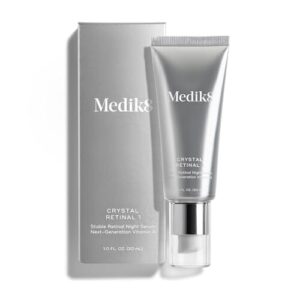
When you’re ready to step up your antiaging skincare, retinaldehyde strength matters. Medik8 Crystal Retinal 1 Serum delivers 0.01% retinaldehyde—a beginner retinoid formulation that works 11 times faster than standard retinol while staying gentle enough for sensitive skin.
Clinical results show 92% of users report smoother texture, and 85% see reduced fine lines within six weeks. User reviews consistently highlight minimal irritation, thanks to glycerin and hyaluronic acid buffering dryness.
This serum accelerates skin cell turnover without the harshness typical of antiaging products, making it an ideal entry point into effective antiaging skincare.
Best For: Beginners or those with sensitive skin looking to start using retinoids for anti-aging without harsh irritation.
- Works 11x faster than standard retinol with clinical proof of smoother texture (92% of users) and reduced fine lines (85% within 6 weeks)
- Minimal irritation—89% experienced no side effects, even with daily use, thanks to glycerin and hyaluronic acid
- Progressive strength system lets you gradually increase potency as your skin builds tolerance
- Premium price point at $55-69 may not fit all budgets, though most users consider it worth the cost
- Results require consistency and patience—some users report minimal or slow improvements
- Initial adjustment period can include mild dryness or flaking for about 12% of users
2. CeraVe Salicylic Acid Exfoliating Cleanser
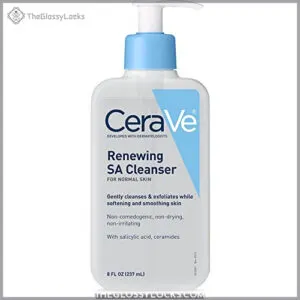
While retinol addresses aging, salicylic acid exfoliation clears the path for better absorption. CeraVe’s 2% salicylic acid cleanser delivers chemical exfoliation that unclogs pores and smooths rough texture without harsh scrubbing.
This gentle face wash pairs acne treatment with hydration balance—ceramides and hyaluronic acid prevent the dryness typical of exfoliating acids. For sensitive skin, the 0.5% variant offers milder skin exfoliation suitable for daily usage.
Clinical feedback shows 737 out of 778 users report softer skin, making this gentle cleanser effective across multiple concerns while maintaining barrier health.
Best For: Anyone with oily, acne-prone, or rough-textured skin looking for a gentle daily cleanser that exfoliates without stripping moisture.
- Combines 2% salicylic acid with ceramides and hyaluronic acid to unclog pores while maintaining skin barrier health
- Non-comedogenic and fragrance-free formula works for sensitive skin, with 95% of users reporting improved texture and softness
- Effective for multiple concerns including acne, blackheads, keratosis pilaris, and even removes waterproof makeup
- May cause initial purging or slight dryness, especially for sensitive or compromised skin types
- Requires consistent follow-up with moisturizer and SPF to prevent over-drying from the 2% salicylic acid concentration
- Results take time with regular use—not an instant fix for breakouts or texture issues
3. ALASTIN Eye Cream Dark Circles
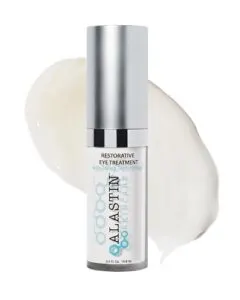
Beyond surface exfoliation, eye cream targets the delicate undereye area where aging first appears. ALASTIN’s Restorative Eye Treatment achieved a 39% reduction in dark circles after 12 weeks, with clinical efficacy documented across multiple skin types.
The TriHex Technology drives matrix remodeling—87% of biopsies showed improved collagen and elastin deposition. Subject satisfaction reached 100%, with unanimous reports of a brighter under-eye appearance.
The tolerability profile proved outstanding: zero adverse events and no irritation across Fitzpatrick types I–III. This peptide eye gel delivers measurable structural improvement, not just temporary skin care for superficial concerns.
Best For: People with persistent dark circles and early signs of aging who want clinically proven results and have the budget for premium eye care.
- Clinical study showed 39% reduction in dark circles after 12 weeks with 100% subject satisfaction and zero adverse events across different skin types.
- Biopsies revealed 87% of samples had improved collagen and elastin structure, meaning actual tissue remodeling rather than just surface-level cosmetic effects.
- Hydrating formula works for sensitive skin without causing irritation, redness, or flaking during the study period.
- High price point at $114 may not fit everyone’s skincare budget, especially for a 0.5 oz product requiring ongoing use.
- Some users outside the clinical study reported irritation and swelling, suggesting results and tolerance can vary despite the study’s clean safety profile.
- Not ideal for layering under makeup according to some users, which limits daytime application options.
4. La Roche-Posay SPF 30 Moisturizer
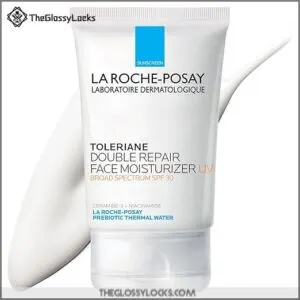
While eye treatments address fine lines, sun protection remains your most powerful anti-aging tool. La Roche-Posay’s SPF 30 Moisturizer combines broad-spectrum UVA and UVB protection with hydration levels reaching 48 hours through ceramide-3 and niacinamide. This ingredient synergy prevents sun damage while restoring barrier function.
The lightweight, fragrance-free formula suits sensitive skin, with zero comedogenic risk. Clinical testing confirms consistent SPF efficacy without the greasy texture typical of combined sunscreen moisturizers. You’re protecting against photoaging while maintaining comfort—a non-negotiable pairing for daily use.
Best For: People with sensitive skin who need daily sun protection combined with long-lasting hydration in a lightweight, non-greasy formula.
- Delivers 48-hour hydration with ceramide-3 and niacinamide while providing broad-spectrum SPF 30 protection against premature aging
- Lightweight, fast-absorbing texture works well under makeup without feeling heavy or leaving a greasy residue
- Fragrance-free and non-comedogenic formula is safe for sensitive skin and won’t clog pores
- Higher price point at $25.99 may be a barrier for some budgets compared to standard moisturizers
- Less moisturizing than dedicated hydrators without SPF, which may require layering for very dry skin
- Slight sunscreen scent on initial application (though it dissipates quickly) and limited availability in certain regions
5. EltaMD Tinted Mineral Sunscreen SPF 50
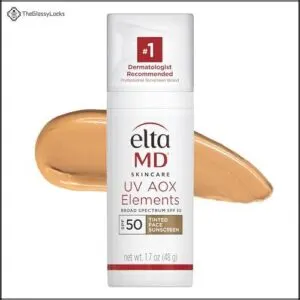
When you’re choosing between mineral SPF advantages and chemical filters, EltaMD‘s offering delivers both sun protection and complexion enhancement. The formula contains 9.0% zinc oxide and 7.5% titanium dioxide for complete UVA and UVB protection while adding sheer, tinted coverage that evens skin tone.
This mineral approach prevents sun damage without chemical irritants, making it ideal for sensitive skin use. Dermatologists rank it among top broad-spectrum protection options in 2025.
The tinted sunscreen benefits extend beyond defense—hyaluronic acid hydrates while bisabolol calms inflammation, proving that high SPF doesn’t require sacrificing skincare quality.
Best For: Those with sensitive skin seeking a multitasking tinted mineral sunscreen that protects against UV rays and blue light while providing sheer coverage and a natural glow.
- Delivers broad-spectrum protection with 100% mineral actives (9% zinc oxide, 7.5% titanium dioxide) plus antioxidants to shield against UV rays, pollution, and blue light
- Doubles as a tinted moisturizer with hyaluronic acid and bisabolol to hydrate and calm skin while blurring imperfections and evening skin tone
- Dermatologist-rated top mineral sunscreen for 2025, formulated without parabens, fragrances, or chemical filters—safe for sensitive skin
- May appear orange-toned on very fair skin, particularly those with rosacea
- Pricier than many drugstore sunscreens, which could be a barrier for budget-conscious buyers
- Can feel overly hydrating when layered with moisturizer, and some users report occasional irritation or breakouts despite its gentle formula
Lifestyle Habits to Enhance Anti Aging Results
Your skincare products can only take you so far—what you do outside your routine matters just as much for how your skin ages. The choices you make daily, from what you eat to how you manage stress, directly influence collagen production, inflammation, and cellular repair.
Let’s look at four lifestyle factors that can strengthen your anti-aging efforts.
Balanced Diet and Skin Health
What you put on your plate directly impacts your skin’s ability to fight aging. Dietary antioxidants from colorful fruits and vegetables combat free radicals that accelerate skin aging, while omega-3 fatty acids support skin hydration and barrier function.
You’ll want to prioritize collagen-rich foods like bone broth and vitamin C sources that boost collagen production.
Minimize processed foods, which trigger inflammation and disrupt gut health—a key factor in skin health.
Adequate hydration from water-rich foods and beverages maintains skin hydration from within, complementing your topical routine.
Managing Stress and Improving Sleep
When stress disrupts your cortisol levels, it accelerates skin aging through oxidative damage and inflammation. Meditation benefits include lengthened telomeres and reduced stress hormones, while adaptogenic herbs like Ashwagandha lower anxiety and improve sleep quality.
Integrative approaches combining stress reduction with better sleep quality improve skin health by minimizing hormonal changes and environmental factors that compromise your complexion.
Prioritize selfcare practices for skin health—quality rest helps your skin repair and regenerate nightly.
Benefits of Regular Exercise
Regular exercise acts as a powerful anti-aging tool, increasing blood flow to deliver oxygen and nutrients that support collagen production and cellular repair. Improved circulation boosts skin cell turnover and collagen synthesis, while reduced inflammation combats skin aging and preserves skin elasticity.
Exercise triggers antioxidants that neutralize free radicals, protecting your complexion. Beyond physical benefits, it boosts mental wellbeing, creating a thorough approach to maintaining youthful skin.
Protecting Skin From Environmental Damage
Your skin faces a constant barrage from pollution, UV rays, and free radicals that accelerate aging and break down collagen faster than your body can rebuild it. Protecting skin from environmental stressors requires a multi-layered defense:
- Apply broad-spectrum SPF daily to shield against UV radiation and ozone layer depletion effects
- Use antioxidant serums containing vitamin C or E to neutralize free radical damage from pollution effects
- Minimize blue light exposure from screens, or apply protective formulas before prolonged device use
Strategic skin protection preserves your youthful complexion against daily environmental assaults.
Frequently Asked Questions (FAQs)
What is a good anti-aging routine?
Ironically, most people chase youth with products that promise miracles yet skip the basics. A good anti-aging skincare routine combines gentle cleansing, targeted serums with retinol or vitamin C, hydrating moisturizers, and daily SPF—adapted to your mature skin’s needs and applied consistently.
What are some exercises to slow muscle aging?
Resistance training builds muscle mass and slows age-related decline, while cardio benefits your cardiovascular system and aids protein synthesis.
Flexibility exercises maintain range of motion, and proper exercise timing optimizes recovery and collagen production for improved skin firmness.
What is an anti-aging skin care routine?
An ounce of prevention beats a pound of cure, which is why an antiaging skincare routine focuses on preventative measures and product layering to address skin aging signs.
Your individualized routine usually includes gentle cleansing, targeted serums with antiaging benefits, moisturizers, and daily SPF—all integrated into your lifestyle with realistic expectations about the skin aging process.
What is the best skin care routine for healthy aging?
The best antiaging skincare routine for mature skin needs involves consistent product layering: gentle cleansing, antioxidant serum application, targeted treatment with retinoids or peptides, and daily SPF protection.
Routine customization based on your skin aging signs guarantees long-term benefits through preventative skincare practices.
When is the best time to start an anti-aging routine?
Preventative skincare works best when started in your mid-20s, as collagen decline begins around age
However, starting later still protects against further sun damage and premature aging, regardless of genetic predisposition or visible signs.
What is anti aging skin care?
You mightn’t realize it, but antiaging skin care targets cellular repair and collagen synthesis to slow visible aging.
It confronts fine lines, wrinkles, and dullness through product efficacy focused on skin rejuvenation and long-term health preservation.
What is the best anti-aging routine?
Your best antiaging skin care routine blends key antiaging ingredients like retinol, vitamin C, and hyaluronic acid with routine personalization based on your aging skin needs.
Morning vs. evening product order matters—sunscreen protects by day, while treatment serums work overnight.
Budget considerations and long-term effectiveness guide smarter choices.
What is the most effective anti-aging procedure?
Think of aging skin as a path where you can smooth the roughest patches with professional help. Laser resurfacing stands out as the most effective antiaging procedure, addressing wrinkles, texture, and pigmentation by stimulating deep collagen renewal—though your dermatologist may recommend combining it with microneedling or neuromodulators for best results.
What is the most effective anti-aging exercise?
Cardiovascular exercise delivers the strongest anti-aging benefits for your skin. Activities like running, cycling, and swimming improve circulation, delivering oxygen and nutrients that support collagen production and skin elasticity while reducing inflammation associated with skin aging.
What is the best thing to use on your face for anti-aging?
Topical retinoids remain the best approach for antiaging skin care, backed by decades of research. These ingredients boost collagen production and accelerate cell turnover.
Pair them with antioxidant serums containing vitamin C, peptide creams for firmness, and broad-spectrum sunscreen benefits to protect against further damage.
Conclusion
Your skin’s renewal timeline lengthens with each passing decade, but effective anti-aging routines work by accelerating cellular turnover and rebuilding what photoaging damages. Think of your regimen as compound interest for your complexion—consistent deposits of retinol, vitamin C, and sunscreen accumulate measurable returns in texture and firmness.
The clinical data confirms what dermatologists observe daily: patients who follow evidence-based protocols see visible improvements within three months. Your commitment to proper application order and daily sun protection determines whether you preserve your skin’s resilience or watch it decline.
- https://advancedwellmd.com/blog/anti-aging-trends-in-2025/
- https://www.startus-insights.com/innovators-guide/anti-aging-market-report-key-insights/
- https://pmc.ncbi.nlm.nih.gov/articles/PMC9236175/
- https://www.urmc.rochester.edu/news/story/older-adults-who-sleep-poorly-react-to-stress-with-increased-inflammation
- https://media.market.us/anti-aging-statistics/

